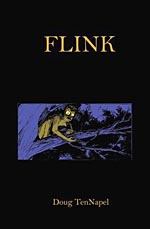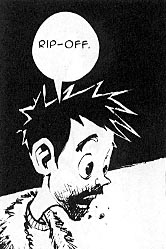 By Doug TenNapel
By Doug TenNapel
112 pages, black and white
Published by Image Comics
Having an effective ending to a story is, ultimately, crucial to how people will remember your creation. It’s the last thing that you encounter, so a mediocre story with a great ending will probably be thought of as better than its average level of quality really is. Likewise, a good story with a bad ending can poison the proverbial well, destroying a lot of goodwill that was built up with the audience until that point. In the case of Doug TenNapel’s new graphic novel Flink, the shift in my reception because of the last six pages? To say that it was immense was an understatement.
Conrad and his father are heading into the wilderness of Washington’s Olympic State Park in search of the legendary bigfoot, but when their plane crashes into a lake, Conrad abruptly finds himself alone. With a rampaging bear nearby, Conrad’s only hope of survival is Flink… one of the race of bigfoots that Conrad and his father were hunting, a race that has sworn off all human contact.
 I’ll admit that up until the last six pages, I was enjoying Flink. It’s not a terribly deep story, but it was a satisfying one, with Conrad and Flink both having lost loved ones, and learning how to trust and help each other. We’ve seen them all before, and it was enjoyable enough. Unfortunately, somewhere along the way, TenNapel seemed to flinch from the ending the book was moving towards. Instead, the book provides a new status quo at the very end to create an overly-cheery ending, one that rings so false that it feels like a tacked on last-second addition to the book.
I’ll admit that up until the last six pages, I was enjoying Flink. It’s not a terribly deep story, but it was a satisfying one, with Conrad and Flink both having lost loved ones, and learning how to trust and help each other. We’ve seen them all before, and it was enjoyable enough. Unfortunately, somewhere along the way, TenNapel seemed to flinch from the ending the book was moving towards. Instead, the book provides a new status quo at the very end to create an overly-cheery ending, one that rings so false that it feels like a tacked on last-second addition to the book.
I’m not against a cheery ending to a story; there’s certainly no need for all books to have grim or downbeat conclusions. But Flink unfortunately goes way too far in the other direction. Even with some of the ending foreshadowed earlier, it still comes across as a cheat; TenNapel is trying to have it both ways with his story, both planting pieces of darkness in his story and then undoing them all at the conclusion. The thing is, it could have been very easily preventable. Without giving away any actual pieces of plot, all it would have taken was a shift in viewpoint to a different character early on and a lot of the problems could have been solved. It would have robbed TenNapel of his surprise ending, sure, but considering that surprise made me stop reading, stare at the page, and say out loud in a disgusted tone of voice, “You have got to be kidding me,” that’s not really a bad thing.
 The sad thing is that like I’d said, up until that point I was enjoying Flink. It certainly wasn’t an eye-opening, ground-breaking story but it was fun, it was pleasant, it was interesting. I’d liked the relationship between both Flink and Conrad, and Flink and the other bigfoots. The art was particularly nice, with thick brush strokes giving the inks a smooth, pleasing quality. There were little touches here and there that were fun, like the hand-held game device needing time to dry out in the sun after getting dunked in the lake, or Conrad’s method to lure away the bear. Really, until the ending? A positive review was half-written in my head.
The sad thing is that like I’d said, up until that point I was enjoying Flink. It certainly wasn’t an eye-opening, ground-breaking story but it was fun, it was pleasant, it was interesting. I’d liked the relationship between both Flink and Conrad, and Flink and the other bigfoots. The art was particularly nice, with thick brush strokes giving the inks a smooth, pleasing quality. There were little touches here and there that were fun, like the hand-held game device needing time to dry out in the sun after getting dunked in the lake, or Conrad’s method to lure away the bear. Really, until the ending? A positive review was half-written in my head.
After re-reading Flink before writing this review, I thought that perhaps I was being too hard on the book. Now that I’ve done so, I regretfully have to say that it’s not the case. Flink is a book where TenNapel throws out a lot of reader goodwill in favor of either a last-second surprise, or an attempt to overly-saccharine the story to somehow. Perhaps both, it’s hard to say. It’s a real shame, because TenNapel is a talented creator (I’m still especially fond of CreatureTech) and I’d hoped his latest graphic novel was a winner. In this case, though, the whole is far than less the sum of its parts, thanks to one defective part in particular.
Purchase Links: Amazon.com
